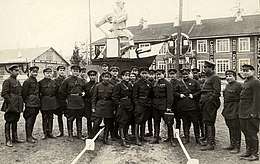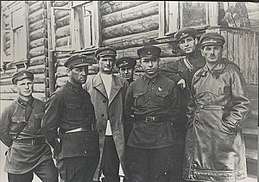Matvei Berman
Matvei Davidovich Berman (Russian: Матвей Давыдович Берман; April 10, 1898 – March 7, 1939) was a Soviet intelligence officer and head of the Gulag Soviet prison camp system from 1932 to 1937.[1]
Matvei Berman | |
|---|---|
| Born | April 10, 1898 Chita, Transbaikal Oblast, Russian Empire |
| Died | March 7, 1939 (aged 40) |

Life
Berman was born in Andiranovka, Chita, Transbaikal Oblast, the son of a Jewish brickyard owner. He joined the Russian army and entered the military school in Irkutsk. He then became a cadet of the 25th Reserve infantry regiment. Berman joined the Bolsheviks in June 1917. In 1918 he joined the Red Army and was stationed in Tomsk and in June was working in a propaganda unit. In August 1918, Berman joined the Cheka and was named chief of uyezd-level Cheka in the city of Glazov. From 1923 to 1924, he was the People's Commissar for State Security in the Buryat-Mongol Autonomous Soviet Socialist Republic. He then led the OGPU in Central Asia. From February 1927 to October 1927 he was the chairman of the OGPU in the Uzbek Soviet Socialist Republic.
In November 1929 he helped develop the Gulag system of camps and became deputy chief of the Gulag in 1930. From June 9, 1932 to August 17, 1937 he was head of the Gulag.[1] He was awarded the Order of Lenin on August 4, 1933, soon after the completion of the White Sea – Baltic Canal.[2] By 1935, by his own count, Berman was in charge of over 740,000 prisoners working on 15 major projects in the Gulag.[3][4][5]

After the fall of Genrikh Yagoda, Berman continued to rise in the hierarchy of the NKVD and he held the offices of head construction of the Moscow-Volga Canal and deputy head of the NKVD in 1936-1937.[4]
In August 1937, Berman's fall began in the time of the Great Terror. On August 17, 1937, he lost his position as head of the Gulag and was appointed People's Commissar of Posts and Telecommunications (Russian: Наркомпочтель). On December 23, 1938, he was expelled from the Soviet Communist Party, arrested the next day in the office of Georgi Malenkov, and sent to prison at Lubyanka. He was found guilty by the Military Collegiate of the Supreme Court of the USSR of belonging to a "terrorist and sabotage organization" and shot on March 7, 1939, at Kommunarka.[4]
On October 17, 1957 Matvei Berman was legally rehabilitated.[4]
Family
Matvei Berman's brother, Boris Davidovich Berman was also a leading NKVD officer.[4] Another brother, Solomon Berman (1902–40), also held senior NKVD posts in the regions until his arrest in October 1938 and execution on 19 January 1940.[6]
Awards
- Honorary worker of the Cheka-GPU (V) (1924)
- Order of the Red Banner (1927)
- Order of Red Banner of Labor Uzbek SSR (1927)
- Honorary worker of the Cheka-GPU (XV)
- Order of Lenin(1933)
- Order of the Red Star (1937)[4]
Sources
- Khlevniuk, Oleg V. (2004). The History of the Gulag. From Collectivization to the Great Terror. New Haven: Yale University Press. p. 418. ISBN 0-300-09284-9.
- К.А. Залесский (KA Zalessky): Империя Сталина. Биографический энциклопедический словарь (Stalin's Empire, Biographical Encyclopedic Dictionary) veche Moskau-Verlag 2000, ISBN 5-7838-0716-8
- Н. В. Петров, К. В. Скоркин (N.V. Petrov, K.V. Skorkin): Кто руководил НКВД, 1934-1941 - Справочник (Who Directed the NKVD, 1934-1941), Swenja-Verlag 1999, ISBN 5-7870-0032-3
References
- Khlevniuk, p. 346
- Khlevniuk. p. 35, states that he received an award on July 15, 1933 for his work on the canal
- Khlevniuk, p. 86
- Who Directed the NKVD (in Russian), (select "БЕРМАН МАТВЕЙ ДАВЫДОВИЧ") on the Memorial website, accessed June 15, 2010
- Bibliotekar (in Russian), accessed June 15, 2010
- Who Directed the NKVD (in Russian), (select "БЕРМАН БОРИС ДАВЫДОВИЧ")(in Russian), accessed 25 September 2019